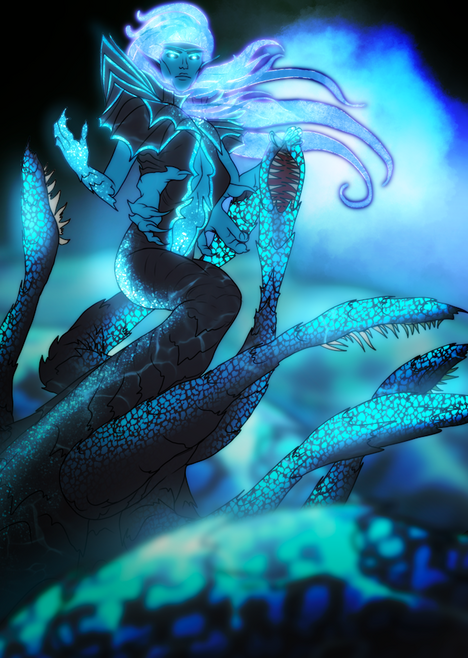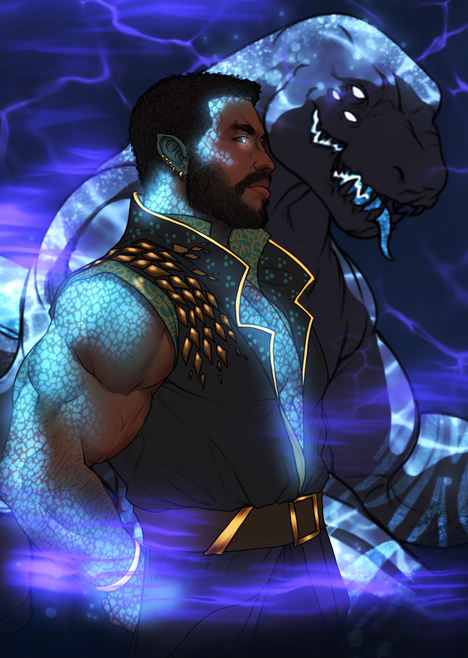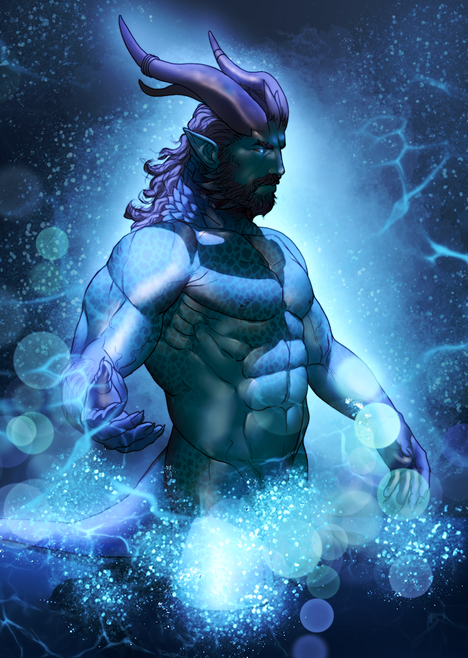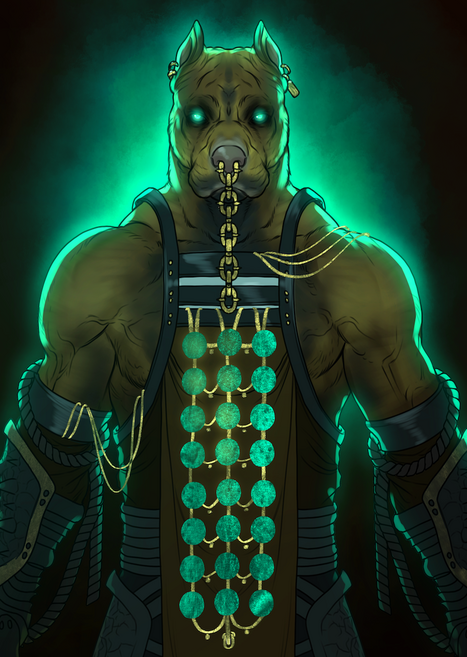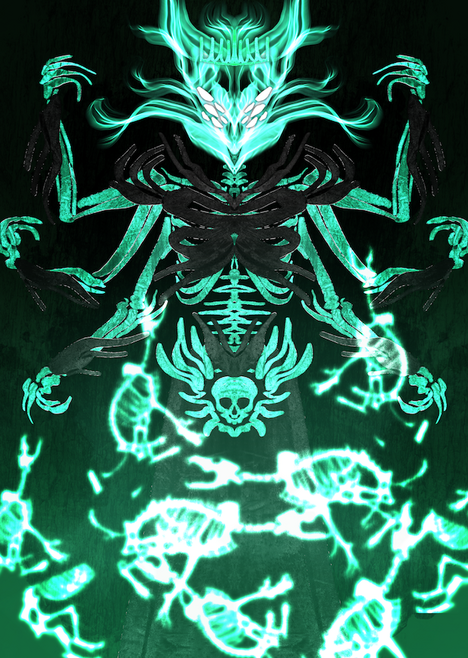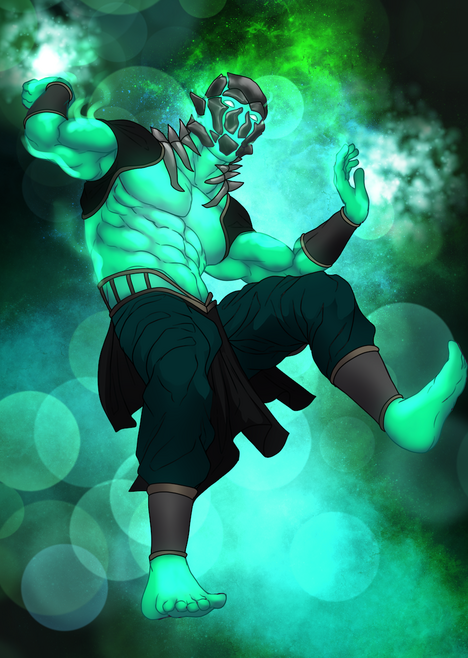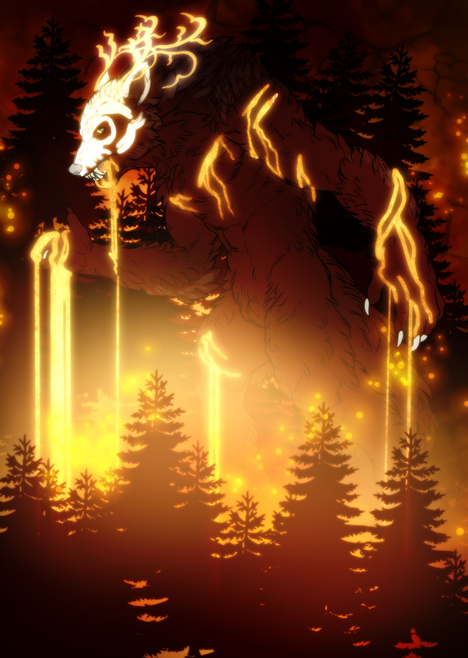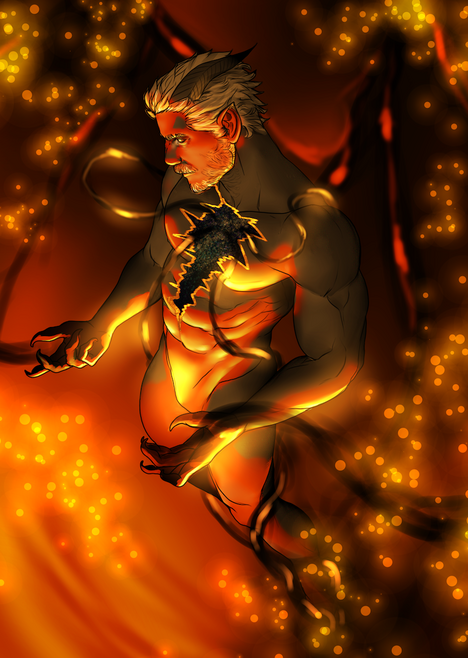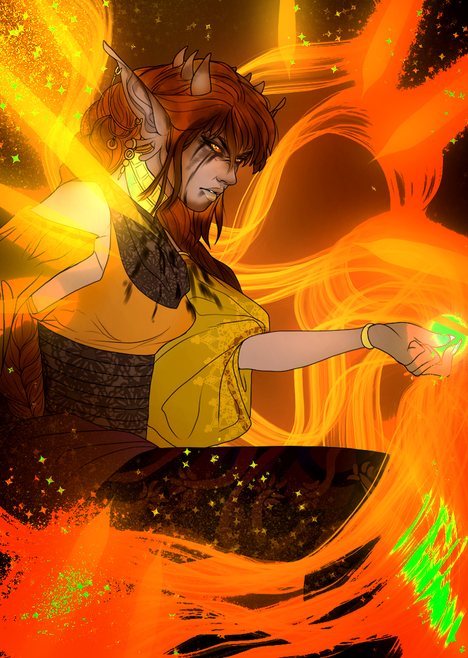More actions
The Minor Faiths are not one consolidated Religion, but a collection of smaller Religions that do not have as wide a following as the other global civilizations spanning Religions like Unionism do. Minor Faiths cross various societies and cultures, and some even pre-date the current cycle of civilizations, meaning that none of these Religions are traditionally tied to any one people of Aloria, and can be followed or worshiped by any Character. Minor Faiths work slightly differently than main Religions, as they have much more simplified dogma. The legal status of Minor Faiths in Regalia is dubious at best. While The Deep Will and The Broken Gods are not strictly illegal, and generally perceived as cults in Regalia, The Mortis Cult is extremely illegal, and anyone worshiping this Religion should take effort to hide it from the general public, or face persecution for their heinous beliefs. Minor Faith Gods cannot be summoned with Divinium, but may appear during Events.
The Deep Will
The Deep Will is a coalescence of the fascination of the living with the deep blue seas of Aloria, awe and terror for the unknown dark deeps, and a respect and fear worship of the great Gods of the sea. It is a pan-Religious movement that incorporates Gods from various Religions, but these Gods all hold roles unique to the Deep Will. The Deep Will is present in custom even in other societies that follow other Religions, due to the threat the Deep Ones (their Gods) pose to other Religions and sailors. Even a Unionist or Estelley sailor might bring an offering to the Gods of the Deep Will, purely to satisfy their desire to rule the seas, a domain that other Gods usually do not tread. The Deep Will does not have an afterlife or a concept of vices and virtues, though it demands respect for the behemoths and unknowable powers of the sea, and also has a unique feature in that its followers choose one of the Gods as their Patron, and are then locked-in to see the other two as competitors and enemies, still worthy of offerings for appeasement, but also a basis to compete with the followers of the other Gods.
Gods
- Vyrë Vyrë is an Estelley Goddess of the Elven Seas, the ocean masses around the old Allorn Empire and its direct neighboring continents. While her Estelley dogma preaches respect for authority, seniority and power, her Deep Will variant demands all these things only for herself, as she wishes to rule all of the seas as a beautifully deadly Empress of the deep. Vyrë's themes are mollusks and octopodes, with her vast teethed and barbed tentacles dragging ships down to the depths if their passengers offend her authority and power. Her followers combat the other Deep Ones with the power of Magic, calling upon the arcane mysteries of Water and Shadow Magic to both confuse and drown. Vyrë's worshipers also prefer intellect over brawn and brute force, using diplomacy to position between the more natural rivalry between Morrlond and Xeradon to have their worshipers tire each other out, before mopping both up together. Vyrë's presence in the Deep Will is considered a subterfuge attempt of hers to maintain some level of authority outside of the Estelley Pantheon, where she is considered one of the optional Gods. She does not desire to be seen as merely optional, and thus has cultivated a presence outside of Estelley where she can do as she pleases, without interference from the Empresses and the other Ordained Estelley Gods.
- Xeradon Xeradon does not come from any other Religion, and rules the southern warm seas such as those around and in Hadar and Sendras. While the other two Gods hold some distance to the faithful, Xeradon is almost scarily close to his followers, even visiting deep-sea colonies like Vas-Zera, Vas-Rohul, and Vas-Mahidol, each of them large undersea cities inhabited purely by a mixture of water-breathing ethnicities who are all Xeradon worshipers. He is actually a massive behemoth beast god, but shapeshift to the body of a mortal Elf or Allar. From his cities he selects his deep brides, and sires his Deep Crowned children. His followers combat the other Deep ones with the power of Biology; to be born more perfect, more beautiful, faster, smarter, stronger, and so much more. Xeradon's children are considered his princelings, heirs to the southern seas, but also notably landwalkers. To the Deep Crowned, land and all its land-dwellers are something of a playground for them to do with as they please. This means that Xeradon worshipers have more emphasis and focus on land than the other deep worshipers do. Though on the flip-side, this can also lead to Xeradon worshipers having a very irreverent attitude towards that which happens on land, something that often puts them at odds with the law or each other, especially when they feel other Deep Crowned are trespassing on their domain.
- Morrlond Morrlond is an Evolism God of the undefeated depths and is generally thought to rule the northern cold seas between the frozen and tundra continents. His analog in Evolism regarding dueling, tournaments, and being the most martially skilled warrior, is continued as a theme within The Deep Will. His followers combat the other Deep Ones with the power of Martial, training to become skilled with weapons and combat techniques, to overpower Biology and Magic by the others. While Vyrë is generally more mysterious and cloak and dagger, and Xeradon is more jovial and irreverent, Morrlond and his followers are considered to be disciplined and serious, taking great effort and care for their pride and vanity. Many of his followers wear symbolic armor and weapons designed in his image, and travel the land to show the superiority of his teachings not only to the other Deep Will worshipers, but also to outsiders of other Religions. Morrlond is also more engaged with the wild-life of the deep seas, seeing many of the larger predator creatures as prey to be hunted, to prove the skill of the hunter and to bring forth as offering to Morrlond. Morrlond also has some representation in the realm of Spirits. While technically his followers favor martial power, they find working with Spirits either possessing them or merging with them and then mastering them as the same skill expression.
Relgious Mechanic
- All worshipers of The Deep Will are granted the gifts of the Deep Ones. These gifts mainly aim at overcoming losses. Any Deep follower who participates in an Event-Calendar noted Tournament that involves Combat Roleplay, and should lose, gains +2 Attack Stat (breaking cap up to 11) for the next Event-Calendar noted Tournament. This effect can stack (increasing the cap by 2 each time also), until they win, after which it is removed. Secondly, the Deep Ones allows all Deep followers to breathe and move quickly underwater but does not grant them underwater Combat Roleplay Mechanics or Abilities. The faster movement does not make them faster than those running on land, it just removes the drag from aquatic movement.
The Mortis Cult
The Mortis Cult, also known as Death Cultism or the Death Cult, is a completely un-nuanced and un-complicated Religion, where the main focus is the worship of the concept of death and a revulsion and hatred of all things living. It is considered the polar opposite of Draconism which is thought to be a Religion of Life, and the Gods within the Mortis Cult seek to generally extinguish all life on Aloria, a goal that is shared by their followers who seek to create a permanent state of un-life or un-death in the world. The exact method by which the Gods achieve this goal differs from patron to patron, and even among the Death Gods, there is a modicum of competition or mutual strife. While The Malefica is considered the pantheon's leader, The Machinist and Consigner alike occasionally sabotage The Malefica's work to protect their own influence and power. There is no Afterlife for the Mortis Cult and no vices or virtues. There is a singular focuses on the extinguishment of all life under the will of The Malefica, with The Consigner and Machinst only adding additional steps as all three feed on the souls of the living.
- The Machinist The Machinist is uncompromising, slow-acting, and meticulously planned evil. While a Death God, the Machinist's focus lies with technology. It desires to own and control the technological progress of the world, to know of all inventions and blueprints, to fill its dark repositories with twisted machines and machinations. And finally, it desires to turn the inanimate and its impeccably designed contraptions to deal mass-death in a cold and automated process. Its followers worship Body-modding, replacing parts of their body with so much machinery that at some point they are more alive than dead, kept functioning merely by the moving of gears and metallic parts. The Machinist seeks to infect all machinery in the world with its influence, bending them to its will, and laying in wait to just the right time to turn the most harmless looking nutcracker doll into a mass-murderer. The Machinist's plots often are counted in centuries if not millennia, it takes great pleasure in the ignorant dependence of those who do know of it, on its inventions. It waits for societies to become utterly reliant on the machines it has whispered to their inventors, only to turn them into an efficient grinding process to feed souls of the dead living to its master the Malefica. It is considered more loyal to the Malefica than the Consigner, but even it must acknowledge that dead things do not invent new machines.
- The Malefica The Malefica is pure uncompromising malice and evil, a crystalized and un-nuanced hatred of all living things. The Malefica offers no mercy, no delay, no reprieve, and takes utter pleasure in meaningless death. For many Religions, even those that already have a form of anti-God, the Malefica is considered the concentrated form of evil without debate. It resides in the Beyond, a mirror-dimension of Aloria where everything is dead, and where the Malefica and the Beyond's denizens consume the souls of the living, feeding on their memories and emotions, and plotting to seek the end of Dragons and the realm of the living. It is said that the Malefica is the source of all Undeath and Shades to further its death-dealing designs. The Malefica's worshipers at best seek to be its most glorified murder-hounds, and at worst become invisible so as not to draw the murderous ire of the Malefica, as it is keen on punishing those it considers weak and undedicated to the cause of ending life. Despite the Malefica's immense power which makes it a considerable candidate for being a primeval God, it cannot physically leave the Beyond and thus has to send agents of death into Aloria to fulfill its desires. There is great power in the worship of death itself through the Malefica, who is known to reward its most prolific fanatics with powers beyond control.
- The Consigner Despite The Mortis Cult being entirely un-nuancedly death fanaticism, the Consigner remains somewhat complicated. At a base line, it is loyal to the Malefica as its liege lord, but the Consigner has taken a liking to the taste of memories of the living, and so its motivations aren't as clear black and white as the Malefica's. The Consigner likes the art of the deal, to negotiate for souls and memories, and to trick anyone foolish to think they can outsmart it into a terrible bargain. The Consigner is generally affable and kind-worded with a sharp wit, which many fail to see through as anything but a wry smile while it shreds innocent souls to pieces for its own satisfaction. The Consigner is to some considered the penultimate challenge, it contains memories and information of the many ages and is generally more willing to part with these nuggets of information. Yet at the same time, failure to outsmart it or just play even during negotiations, can result in an untimely death and consumption by the very deal-maker itself. The Consigner is generally considered the most rebellious towards the Malefica among all Ordial entities of the Beyond, because of its very nature as a memory-eater. If all living things cease to exist, no more memories could be created, and then the Consigner could no longer consume. As a result, it still deals death, but only as much as it needs to, to seem dedicated to the cause.
Relgious Mechanic
- All worshipers of The Mortis Cult are granted the gifts of the Death Gods. These gifts mainy aim at making them somewhere between Undead and Alive. Mortis Cult worshipers can choose to be both Undead and not Undead at the same time, gaining Deathveil Mechanic 1, Deathveil Mechanic 2, and Deathveil Mechanic 3, but are not subject to any of the Undead Rules associated, meaning they can still use God Magic, and be Afflicted. However, if they become fully Undead, then the normal rules apply. From this point, they can be returned to this state of between Undead and Alive by sacrificing a single Static Divinium to cure their undeath and return them to the default state of this Mechanic.
The Broken Gods
The Broken Gods is a coalescence of Gods who have either become abandoned, lost, or joined the pantheon because they aligned with the central message of the Religion. The Broken Gods center their dogma around the concept of rejection and its various aspects. Each God represents a different aspect of rejection, and how that has informed their birth, loss, and eventual revenge. For many of the followers of The Broken Gods, the world is an ugly hateable place, along with all the people and things in it. The Broken Gods offer them a sense of community and companionship, and in some cases, empowerment to take revenge on a world that has scorned them or rejected them. The Broken Gods do not have a formal Afterlife, though it is commonly held among the faithful that if they should die, their Gods will turn them into Spirits so that they may continue to haunt and expose the rot of the world and its natural order. The Broken Gods as a Religion is one that will continue to gather Gods and expand its pantheon over time, potentially even though in-game Events as Religions are scorned and Gods discovered.
Gods
- The Covenant Once the Earth-Mother of Old Ceardia, The Covenant is a beast-Goddess who long pre-dates Religions across Aloria as potentially being one of the first Ailor Gods established in their prehistorical era. The original message and dogma of the Covenant is long lost to time and the ultimate destruction of Old Ceardia, though she is considered perhaps one of the primeval Gods as she is a towering behemoth Goddess that seems tied to reality itself. She was the last Goddess to join The Broken Gods, when her last followers on Ceardia died during the destruction of that continent. Within the pantheon, The Covenant represents a rejection of Gods, or the faithful being rejected by the Gods. This manifests itself for example in faithful of other Religions who become scorned and cursed by their own Gods despite their best intentions, or those who defy the will of their Gods and reject their divine authority over their flock. The Covenant welcomes all who seek vengeance on the other Gods, her lingering envy and hatred for the Fornoss and Unionist Gods for drawing her flock away from the motherland. In the sign of the Covenant, the broken followers defy the will and authority of the Gods of other Religions, and seek vengeance on those who would snuff out any memory of the rejected Gods or the lost Gods. In essence, she is a patron of heretics and anti-theists who seek vengeance for rejection of divinity.
- The Eldertide The Eldertide was the first God of the broken pantheon to form the faith, but only through subtle actions. The Eldertide is a God from a long lost religion that has waned to such a point that it is no longer capable of manifesting its divinity in physical form in Aloria. It exists only in a nebulous reality within the deep dreams of sleeping mortals, hidden in the darkest recesses of their carnal desires and hunger for affection. When the Eldertide appears to mortals, it appears as an unknowable monster, different for every beholder, leading to a satisfying of the deepest desires of the mortal in their dreams, leaving them with a monstrous child when they wake. From this basis, the Eldertide has cultists both in those who wish to be visited by it in their dreams, and those very children that were born in its image, horrendous monsters that assume the glamor of a normal person to pass. The Eldertide represents a rejection of society or a rejection by it, the hypocritical and evil standards of beauty and normalcy that cause an expulsion and revulsion of anything that is abnormal or other. To the broken followers, the Eldertide is the eldritch monster that does not evoke fear of it, but fear of the disgusting reality of society and its cruelty, the very existence of it and its children being what draws attention and exposes the ugliness of what is otherwise deemed civilized.
- The Scornblood The Scornblood is a refraction of the Rejection Arken that ascended to Godhood, likely a divine birth by the coalescence of will from Arkenborn. The Scornblood represents personal rejection from loved ones, family, teachers and mentors, ancestors, descendants and close ones. Due to Scornblood's proximity to Arkenhood, she is in many ways also considered a Goddess of the Arkenborn who are rejected by their close circle, become orphaned, or have violence and repression inflicted upon them. The Scornblood offers Arkenborn and others who have experienced personal rejection from their circle a form of community and mutual belonging, while extending powers to those seeking vengeance for this isolation and othering. The Scornblood was the second God to join The Broken Gods, during the height of the Allorn Empire when the Arkenborn population exploded. While the Allorn Empire looked favorably upon Exist Arkenborn, Void Arkenborn who were born in much higher numbers faced extreme persecution in certain areas, leading to a short-lived Arkenborn state during the collapse of the Allorn Empire that was destroyed within a matter of years. As a result, the Scornblood also extends her aspect of rejection to that of Statehood and Empires, insisting on the unalienable right for the rejected to establish autonomous anarchic communes to make their own world.
Relgious Mechanic
- All worshipers of The Broken Gods are granted the gifts of the Broken Gods. These gifts mainly aim at their spite and rejection from the world's status quo, in allowing them to choose one Mechanic of any Religion except Evolism, and add it to their own Mechanics. Additionally, The Broken Gods worshipers have a unique Mechanic related to Disguises or Monster Transformations. While these would normally be removed upon reaching 0 HP or being Knocked Out, Broken Gods worshipers who are defeated in combat or outside of it can never be forced out of any Disguise or Transformation. Keep in mind, this may cause problems with Knights, because a Monster that is not transforming back, may need to be executed, so use this judiciously.
Trivia
- There are technically more minor faiths, but we keep the list short to avoid splintering the player base between too many niche religions.
- Minor Faiths generally don't have Afterlives, which is seen as much the reason why other Religions succeed converting their followers away.
- Minor Faiths don't have stratified worship practices. As such, players are encouraged to come up with their own, since a lot of these Religions are about personal experience.
| ||||||||||
| Accreditation | |||||||
|---|---|---|---|---|---|---|---|
|
| ||||||
